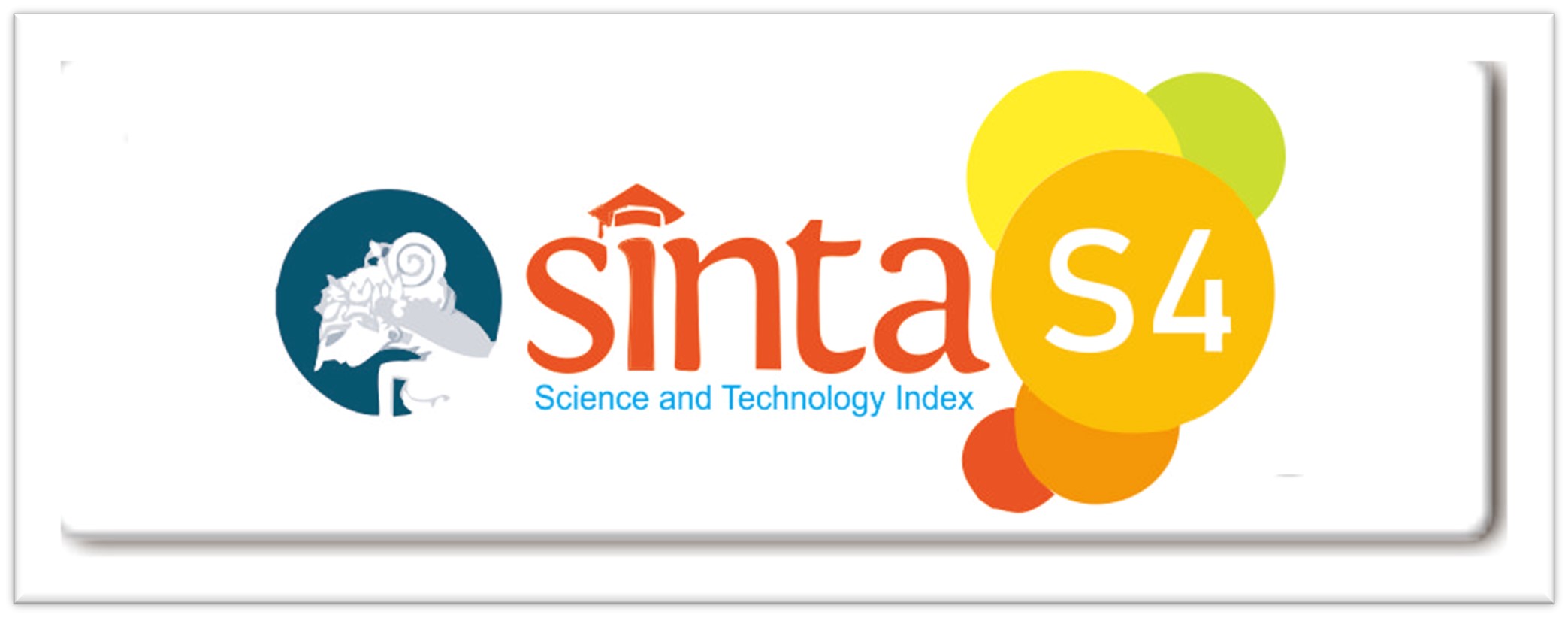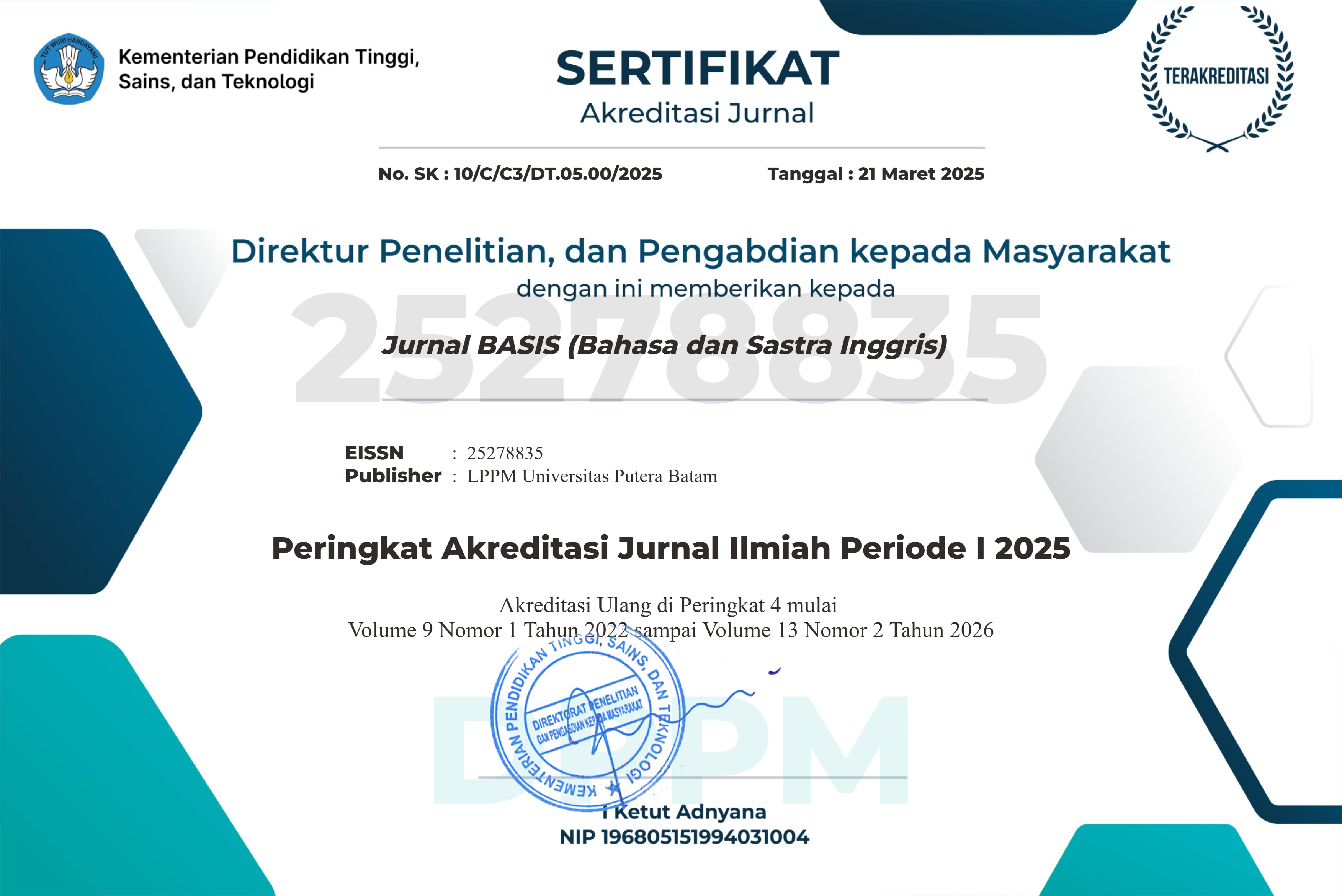READING PORTFOLIO AS A SUPPLEMENTARY ACTIVITY TO LEVERAGE STUDENTS’ READING COMPETENCY
DOI:
https://doi.org/10.33884/basisupb.v7i2.1850Keywords:
Reading Skill, Reading portfolio, ReadingAbstract
Reading as one of the skills constructing English competency has a special portion in the curriculum of English studies programs at higher education institutions. The prevalent purpose of reading classes is to enable students to grasp knowledge from any type of text written in English. This skill could be achieved through learning a series of techniques and strategies in reading, and most importantly extensive reading activities. However, the fact that the class weights as much as 2 credits (SKS) does not give sufficient training time to achieve the maximum target. Hence, an out-of-class activity should be imposed, such as reading portfolio. This paper seeks to address the criteria of a good reading portfolio, as well as the strengths and weaknesses of this supplementary reading activity given to the students of the English Education program of IAIN Purwokerto. The data are collected through documenting the findings of previous researches on the criteria of a good reading portfolio, interviewing student-sample, and observing the process of reading portfolio given to the students of IAIN Purwokerto. The results showed that a reading portfolio should contain the purpose of the course, the text liked and picked by the students, clear scoring criteria, and continuous evaluation. The strengths of reading portfolio are evoking students’ interest for reading, instilling reading habit, and promoting learning autonomy and self-evaluation, the weaknesses are lack of resources, complex vocabulary and structure, and less motivation.
References
Charvade, M. R., Jahandar, S., & Khodabandehlou, M. (2012). The Impact of Portfolio Assessment on EFL Learners’ Reading Comprehension Ability. English Language Teaching, 5(7), 129–139. https://eric.ed.gov/?id=EJ1079679
Cirocki, A. (2013). The reading portfolio: A tool for both learning and assessment in the secondary school EFL classroom. International Journal of Innovation in English Language Teaching and Research, 2(2), 223.
Coombe, C., & Barlow, L. (2004). The reflective portfolio: Two case studies from the United Arab Emirates. English Teaching Forum, 42(1), 18–23.
Day, R. (2015). Extending Extensive Reading. Reading in a Foreign Language, 27(2), 294–301.
Day, R. R., & Robb, T. (2015). Extensive reading. Language Learning beyond the Classroom, 3–12.
Demiroz, H. (2007). Critical reading its key concepts, and importance in foreign language education. Jokkef, 16, 66–78.
Fiktorius, T. (2012). Portfolio assessment in English language teaching (ELT). Academia. Edu.
https://www.academia.edu/2324141/Portfolio_Assessment_in_English_Language_Teaching_ELT_
Grabe, W., & Stoller, F. L. (2020). Teaching and researching reading (Third Edit). New York: Routledge.
Hosni, J. Al. (2017). New Perspective on Portfolios in EFL Classrooms: Portfolio as an Autobiographical Text. Studies in English Language Teaching, 5(4), 771. https://doi.org/10.22158/selt.v5n4p771
Javanmard, Y., & Farahani, H. (2012). Investigating Using Portfolio Assessment and Learning English Language in Qom Secondary Schools. Global Journal of Human Social Sciences, 12, 53.
Kim, Y. H. (2013). The Effect of Task-based Cooperative Learning Method on EFL Learners’ Reading Anxiety in Reading Class. English Literature, 18(1), 379–412.
LPM, I. P. (2016). Panduan Akademik IAIN Purwokerto 2016-2017. Purwokerto: IAIN Purwokerto.
Merriam, S. B. (1998). Qualitative Research and Case Study Applications in Education. Revised and Expanded from “Case Study Research in Education.” San Fransisco: Jossey-Bass Publishers.
Moore, N., Knight, G., & Kiburz, C. (2014). Developing an assessed reading portfolio to improve reading habits and raise test results Developing an Assessed Reading Portfolio to Improve Reading Habits and Raise Test Results. 214–237.
Murat, Ö., Yenal, T. H., & Yenal, A. (2012). Opinions of the physical education and sports candidate teachers about reading 1. International Journal of Human Science.
Ng, Q. R., Renandya, W. A., & Chong, M. Y. C. (2019). Extensive reading: Theory, research and implementation. Teflin Journal, 30(2), 171–186. https://doi.org/10.15639/teflinjournal.v30i2/171-186
Pinar, W. F., Reynolds, W. M., Slattery, P., & Taubman, P. M. (1995). Understanding curriculum: An introduction to the study of historical and contemporary curriculum discourses (Vol. 17). Peter Lang.
Rayner, K., Pollatsek, A., Ashby, J., & Clifton Jr, C. (2012). Psychology of reading (Second Edi). New York: Psychology Press.
Sartika, F. D., Afifah, N., & Anggraini, Y. (2020). the Correlation Between Students’ Reading Habit and Their Reading Comprehension. Jurnal Basis, 7(1), 207. https://doi.org/10.33884/basisupb.v7i1.1856
Shihab, I. A. (2011). Reading as critical thinking. Asian Social Science, 7(8), 209–218. https://doi.org/10.5539/ass.v7n8p209
Silverman, D. (2016). Qualitative research. Los Angeles: Sage.
Stoeckel, T., Reagan, N., & Hann, F. (2012). Extensive reading quizzes and reading attitudes. TESOL Quarterly, 46(1), 187–198.
Toprak, E. L., & Almacıoğlu, G. (2009). Three reading phases and their applications in the teaching of english as a foreign language in reading classes with young learners. Journal of Language and Linguistic Studies, 5(1), 20–36.
Valencia, S. (1990). Assessment: A portfolio approach to classroom reading assessment: The whys, whats, and hows. The Reading Teacher, 43(4), 338–340.
Wu, T.-T., Huang, Y.-M., Chao, H.-C., & Park, J. H. (2014). Personlized English Reading Sequencing Based on Learning Portfolio Analysis. Inf. Sci., 257, 248–263. https://doi.org/10.1016/j.ins.2011.07.021
Yurdabakan, I., & Erdoğan, T. (2009). The Effects of Portfolio Assessment on Reading, Listening and Writing Skills of Secondary School Prep Class Students. Journal of International Social Research, 2(9).
Downloads
Published
Issue
Section
License













 JURNAL BASIS (BAHASA DAN SASTRA INGGRIS)
JURNAL BASIS (BAHASA DAN SASTRA INGGRIS)
